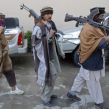
Russia Decides Who the Terrorists Are
Publication: Eurasia Daily Monitor Volume: 13 Issue: 3
By:

At the end of 2015, an unnamed Kremlin official announced that Moscow was now sharing intelligence about the Islamic State with the Afghan Taliban, even though the Taliban remains on the Russian list of terrorist organizations. Predictably the Taliban denied the assertion (Russianews.net, December 26, 2015). But none of this appears to have been picked up by the Russian-language media. It might not be surprising that Moscow does not want Russians to know it is collaborating with one terrorist organization against another, especially in view of the sensitivity in Russia and Central Asia to anything having to do with Afghanistan. But there also have been no Russian denials about this issue, so it is safe to assume such a Russian-Taliban collaboration may indeed be taking place.
Former French leader Charles De Gaulle once remarked that states are “cold monsters.” It, therefore, should perhaps be unsurprising that Moscow is pursuing its own brand of divide-and-conquer policies in this case. Nevertheless, the aforementioned announcement casts a stark, if not lurid, light on Russia’s anti-terrorism policies.
Since Moscow began its military intervention in Syria, it has endlessly trumpeted the idea that it is solely there to fight the Islamic State and terrorists. President Vladimir Putin and his government, dating back to the wars in Chechnya in the 1990s and early 2000s, have been equally adamant that one cannot not distinguish between “good” and “bad” terrorists. Yet, that is exactly what Moscow appears to be doing here. Moreover, this policy characterizes Russia’s approach across the board, not only in Afghanistan. For the last several months, Russian-sponsored terrorists have been conducting terrorist bombings in Kharkiv, Kherson and Odesa (UNIAN, December 26, 2015; Khpg.org, June 1, 2015). Similarly, in Syria, as many observers have repeatedly pointed out, the vast majority of Russian attacks have not been against the Islamic State. Finally, in Gaza, Russia has never branded either Hamas or Hezbollah as terrorists even though they, especially Hamas, are still conducting terrorist operations and periodic missile launches against Israel. Indeed, Hamas leader Khaled Mashaal has repeatedly visited Moscow, and his organization considers Russia’s recognition of Hamas as a “breakthrough for the movement (Al-monitor, June 5, 2014).
To be sure, there can be no doubt of Russia’s professed alarm about the Islamic State. Russia’s new National Security Strategy, announced on December 31, 2015 (see EDM, January 4, 5, 2016), clearly labels terrorism as a major threat to Russia (Kremlin.ru, December 31, 2015). Furthermore, in 2014, Russia announced the creation of five regional defense headquarters in Russia to work alongside the national defense headquarters and coordinate all government agencies against terrorism, among other threats (Interfax, December 16, 2014). Finally, it bears noting that Russian concern about a potential victory in Afghanistan by terrorists goes back years, and Moscow is now offering 100,000 AK-47s to the Afghan government for use in its security and counter-terrorism operations (Thefronteirpost.com, December 31, 2015)
Yet, it remains clear that Moscow’s policy specifically distinguishes between terrorists who serve Russian interests and those who do not, with the latter being subject to endless stigmatization if not physical attack. In addition, it is clear from the war in Ukraine, and from Russia’s earlier efforts to threaten Georgia prior to their August 2008 war, that terrorism is a legitimate instrument of state policy for the Kremlin. The mysterious apartment bombings in Moscow of 1999 have never been solved. But an enormous amount of evidence points to FSB involvement in those operations to provoke a war against Chechnya and catapult Putin into the presidency (see North Caucasus Weekly, January 21, 2004; see EDM June 30, 2015). More recently, a former KGB agent has claimed that Putin initiated the plan that led to the bombing of a Russian flight from Sharm El-Sheikh last fall, killing 224 people to justify the war with Syria (The Daily Mail, December 25, 2015)
Although no definitive proof exists in either of these two last cases, there is little doubt that Moscow, in practice, views the use of terrorism as wholly instrumental and that its hypocrisy reflects a deeply ingrained policy approach. Certainly, as illustrated by Russia’s numerous military exercises, it does not hesitate to proclaim a terrorist scenario to conceal or cover up exercises whose real purpose is large-scale conventional war and/or the invasion of neighboring countries (see “Russia’s Zapad 2013 Military Exercise: Lessons for Baltic Regional Security,” The Jamestown Foundation, December 2015). Consequently observers should not be unduly surprised that Moscow publicly leaked the story of its intelligence collaboration with the Taliban, even as it is providing arms to the Afghan government to fight them. In reality, such opportunism is the hallmark of Russian policy, and there is no reason to expect any fundamental change in 2016, even as Moscow shouts its anti-terrorist credentials in Syria from the rooftops.




